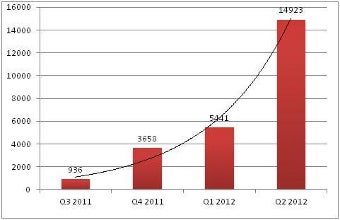Malware on Android - a myth or real threat

Malware on the rise
We're hearing about this almost every day - there's malware on Android, and it's easy to get your device infected. Reports coming from security companies are painting a troubling picture - with each quarter, there are more and more Android programs designed to conquer our devices, take control, steal information or secretly dial premium numbers. The goals of the so-called malware can be most various, but one thing is common for them all - they won't do you any good. But no matter how many reports we get, we can't help but wonder how big of a threat this really is. Should we be worried about it, or should we just ignore? Before we begin our exploration through the supposedly infected lands of Android, it's always good to have a general understanding of what malware is.
Malware, short for malicious (or malevolent) software, is software used or created by attackers to disrupt computer operation, gather sensitive information, or gain access to private computer systems. It can appear in the form of code, scripts, active content, and other software. 'Malware' is a general term used to refer to a variety of forms of hostile or intrusive software.
That's a rather general, yet very true definition we found at Wikipedia. Having in mind that our smartphones have every right to call themselves computers, the above definition works perfectly well for us. Apparently, the most common purpose of malware is to steal sensitive information, or gain access to things you normally wouldn't let your wife have access to. So, now that we know what we're dealing with, let's see if there's really a reason to worry. Let's start by taking a look at some statistics!

Actually, the results of every hacker attack may be different depending on the state of your Android phone and the information that's stored onto it. Sometimes, the attackers might really get access to credit card details, while other times they may simply steal money from you by managing to install software that would make your phone dial premium numbers, send text messages, etc. And while most of the people reading this now are probably thinking that there's no chance they would allow such things to happen on their phone, we should note that the most likely victims of malware are the less educated users. The bad thing is that by "less educated" here we don't mean those who can't tell us the "10 things that make Android the greatest platform of all," we mean those who simply do not take special interest in the way technology works. The most vulnerable users are those who don't see or understand technology the way tech-savvy people do. As you can guess, this kind of people is actually the biggest group of users of every platform, including Android, which is now so widespread there really can't be a profile of the 'typical Android user'.
Horror stories
On the opposite side of the security companies and those supporting their views are those users who aren't willing to belive that there's anything to worry about. These users often say that the major part of all Android malware comes from places outside of the Play Store, so if you just stick to Google's official source of third-party software, you'll be fine. This is partly true, of course, though the very reason why some go for Android is the possibility to do whatever you want with the device. After all, that is what the words "free" and "open" are all about here - sideload whatever you wish, pay for apps, don't pay for apps, get all kinds of stuff from the internet... The thing is if you live that kind of "free" mobile lifestyle some day you'll will probably encounter a piece of malware, willing to do its thing inside your smartphone. And with a bit of bad luck, you might be too late to stop it. Does this mean we should get panicked and think of Android as an insecure platform? Absolutely not.

But as we said earlier, the group of people who aren't really sure what they are doing when they are working with a smartphone or other more complex device, isn't small at all. As a matter of fact, it's quite big, so we do think that it won't be useless if we offer some means of protection. There are a few security applications that users can install in order to ensure that their handset will stay free of malware. Personally, we do not think that such kind of protection is needed in case you absolutely understand what's happening when you're using your mobile device. After all, having constant protection means wasting precious system resources and battery life, and we aren't willing to sacrifice even the smallest amounts of those.
Still, if one does feel unsure about the state of their device, it's probably wiser to install some kind of security app. Some of the better ones include Lookout Mobile Security, Norton Mobile Security, Kaspersky Mobile Security and avast! Mobile Security. These are usually full security packages that will not only provide standard anti-malware protection but will also feature additional tools like remote lock/wipe and others. Once again, we don't consider such measures reasonable at this time, if the user is an educated one, but non-tech-savvy people may actually benefit from installing such a program.
Malware on Android is definitely not a myth. However, it's also not the horror some would like you to think it is. We can't deny that there has been a considerable number of malware victims, but it's also undeniable that the consequences for the bigger part of them have been minor. At the end of the day, if there's one rule that will safely get you through Android land uninfected, it is that if you aren't particularly informed about this kind of technology and the risks surrounding it, it's best to stick to getting your apps from the Play Store, and take your time to read their descriptions and user reviews carefully. If there's anything that seems suspicious, it's best to avoid this particular app.
Even then, one can't take the time to read each and ever description or user review, and there are more and more cases of apps that manage to steal money or info from you using most creative ways. It would mostly be an overstatement to say that we're in for a future filled with dangerous pieces of code looking to get to the critical data we keep on our personal phones, but it'll also be pretty foolish to just ignore the warnings. Maybe the dire predictions of security companies are going to come true some day, and we'll all have to take special measures to secure our mobile devices (just the way we do it with our computers today), but thankfully, this day is yet to come. For now, all we need to avoid Android malware and the dangers it poses is to keep our eyes opened.










Things that are NOT allowed: